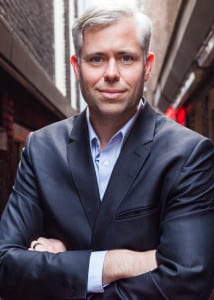
By Andrew Cohen
For Chris Hoofnagle, organizing the 2015 Privacy Law Scholars Conference meant more than just convening top experts from around the world to strengthen connections between academia and practice. It meant providing a uniquely valuable experience worthy of Berkeley Law’s stature in privacy law.
“Papers are presented by a commenter, not by the author,” said Hoofnagle, a Berkeley Law lecturer and a renowned authority on information privacy law. The commenter facilitates pointed discussion about the paper among participants.
“This makes the event more tense, but also more fun,” Hoofnagle said. “We pair up commenters with authors who disagree about matters, junior scholars with senior scholars, and so on. The result we think is better scholarship, because the author has to listen to what readers think the paper says, rather than what the author thinks it says.”
The annual invitation-only event, set for June 4-5 at the Claremont Hotel in Berkeley, alternates each year between Berkeley Law and George Washington University Law School. About 275 participants—legal scholars, practitioners, and other experts in various disciplines—will participate this year.
“If I could attend only one academic conference every year, it would be this one,” said Professor Paul Ohm of Georgetown University Law Center. “Almost all of the important privacy law review articles and books that will be published this year will be debated there. The conference’s impact goes well beyond the legal academy too, because this is a truly interdisciplinary and international conference, one which draws engineers, economists, sociologists, philosophers, policymakers and others from across the country and around the world.”
Confronting hot-button issues
Participants will tackle a bevy of timely topics. They include the expansion of algorithmic decision-making, which Ohm said companies and governments “are using with growing frequency to divide people into smaller and smaller groups, sometimes in unfair or harmful ways.”
Attendees will also discuss what courts may use to replace the “Reasonable Expectation of Privacy Test.” A nearly 50-year-old standard that governs when the Fourth Amendment applies to surveillance, the test has struggled to keep pace with advances in technology.
A program committee for the conference made of leading legal experts in privacy will select papers for awards. Two awards will go to junior scholars, while two others will go to practice-relevant works that inform the privacy profession.
William Cuddihy, the author of a monumental treatise on the Fourth Amendment’s original meaning, will serve as the keynote speaker. His research of nearly 1,200 years of history counters some originalist interpretations of the Fourth Amendment by expanding notions of what government practices were of concern in the past. Former U.S. Supreme Court Justice Sandra Day O’Connor cited Cuddihy’s treatise numerous times, calling it “one of the most exhaustive analyses of the original meaning of the Fourth Amendment ever undertaken.”
Berkeley Law’s top-ranked technology law program has increasingly targeted innovate privacy projects in recent years, and continues to generate leading research and scholarship in the field. Hosting the annual Privacy Law Scholars Conference, Hoofnagle believes, constitutes another feather in the school’s tech-law hat.
“Berkeley has a rich set of interdisciplinary opportunities in privacy,” he said. “We have a set of experts in the law school and elsewhere on campus that has made our university a hub for intellectual and policy development on technology.”